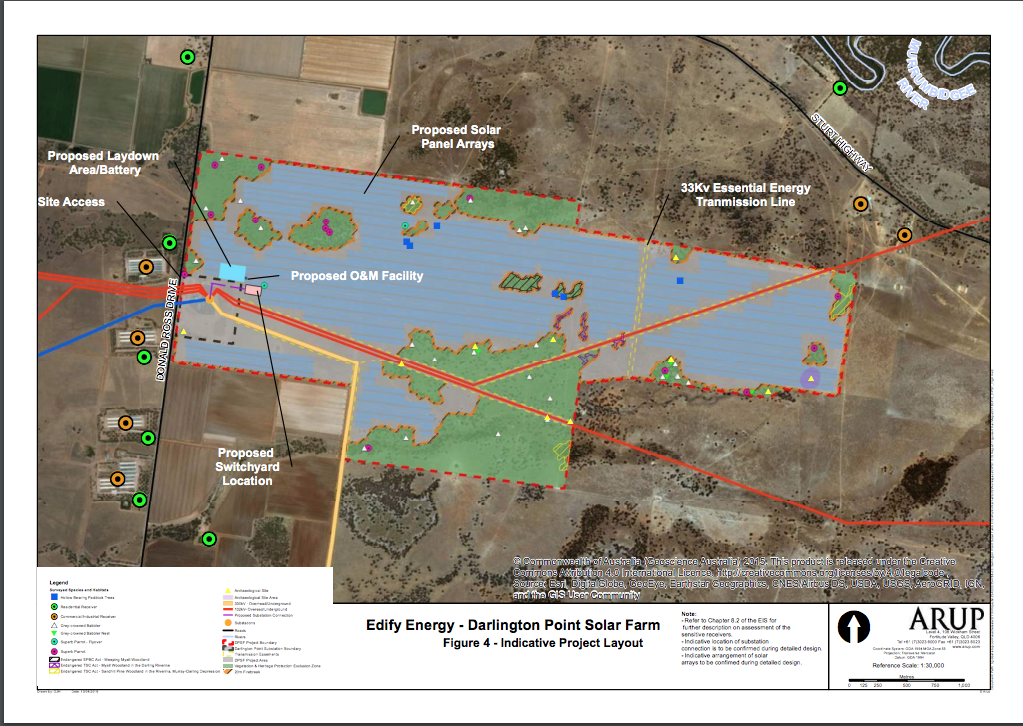The hotspot of Australia’s utility-scale solar activity, New South Wales (NSW), is in line for another massive solar farm 10km south of Darlington Point, near Griffith.
The NSW Department of Planning and Environment has given its approval for the 275 MW solar farm and 100 MWh energy storage facility, noting that there were no submissions opposing the project.
“This is a multi-million project that will power over 130,000 homes each year, boost the local economy, provide up to 300 jobs during and after construction, as well as increasing electricity capacity and helping to cut greenhouse emissions,” Resource Assessments Director, Clay Preshaw, said.
The project approval closely follows the release of a new Large-Scale Solar Energy Guideline developed by the NSW government and designed to lead applicants and the community through the assessment process for state significant solar farm proposals.
“The project has been assessed on its merits, under planning legislation and clear official policies to consider any potential benefits or impacts to the environment, the economy and the community,” Preshaw said, noting that the new guideline reflects the NSW government’s strong commitment to the state’s booming solar energy market.
According to the NSW government’s data, 49 utility-scale PV projects have been approved across the state, representing some 3.3 GW of capacity. Further 34 solar farms are under construction.
The Darlington Point project is proposed by Australian renewables developer Edify Energy, which already has a number of large scale solar projects under its belt, including Gannawarra, Whitsunday, Hamilton, Daydream and Hayman solar farms.
According to the developer’s environmental impact statement released earlier this year, the Darlington Point project is expected to feature up to one million polycrystalline silicon solar panels mounted on steel frames with a single-axis tracking system and around 55 inverter stations.
It will be built in the vicinity of the TransGrid Darlington Point Substation, eliminating the need for additional transmission line easements and replication of costly infrastructure, which was one of the main reasons for selecting the location.
According to Edify Energy, the 100 MWh battery will be developed at a later date and be operational by December 2020.
This will be the second big battery in the company’s portfolio. Together with Germany’s Wirsol, Edyfy owns Australia’s largest battery retrofitted to a solar farm – the 25 MW / 50 MWh Tesla battery collocated with the 60 MW Gannawarra Solar Farm, Victoria, and commissioned last month.
The entire project is estimated at $407 million, consisting of $353 million for the solar farm and $54 million for the energy storage facility.
It is expected to generate around 577,000 MWh of clean electricity a year, enough power to supply 130,000 homes.
Once completed, the Darlington Point solar PV project will be among Australia’s biggest solar farms currently in the development pipeline, such as innogy’s 349 MWp Limondale Solar Farm and Maoneng’s the 255 MWp Sunraysia Solar Farm in New South Wales, Total Eren’s 256.5 MWp Kiamal Solar Farm in Victoria.
The battery will also be among the nation’s largest, including the South Australian Tesla big battery (110 MW/129 MWh) at the Hornsdale Power Reserve and a 120 MW/140 MWh energy storage facility proposed by SIMEC Zen Energy, as part of UK steel billionaire Sanjeev Gupta’s 1 GW dispatchable renewable energy program for South Australian industrial town Whyalla.
This content is protected by copyright and may not be reused. If you want to cooperate with us and would like to reuse some of our content, please contact: editors@pv-magazine.com.









1 comment
By submitting this form you agree to pv magazine using your data for the purposes of publishing your comment.
Your personal data will only be disclosed or otherwise transmitted to third parties for the purposes of spam filtering or if this is necessary for technical maintenance of the website. Any other transfer to third parties will not take place unless this is justified on the basis of applicable data protection regulations or if pv magazine is legally obliged to do so.
You may revoke this consent at any time with effect for the future, in which case your personal data will be deleted immediately. Otherwise, your data will be deleted if pv magazine has processed your request or the purpose of data storage is fulfilled.
Further information on data privacy can be found in our Data Protection Policy.